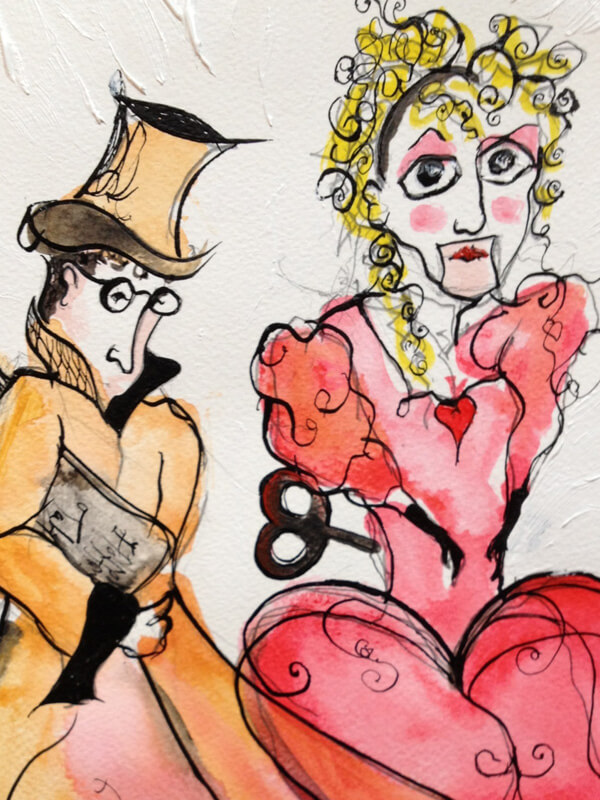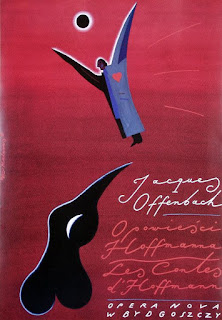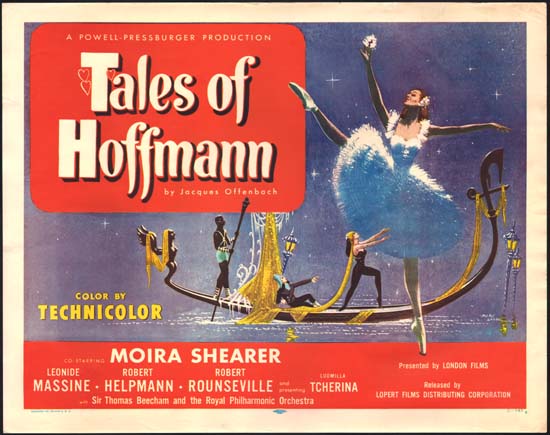QUOTE:
AUTHOR: Geoffrey Latham
MEANING OF THE QUOTE:
"What all people have in common is their
understanding of the language of music."
COMPOSER
OFFENBACH

TALES OF HOFFMANN
(Les Contes d'Hoffmann)
TALES OF HOFFMANN
DOLL'S SONG
Les Oiseaux Dans la Charmill
(The Birds in the Arbor or Olympia's Aria)
Mady Mesple, Vocal
BARCAROLLE

(From French, also barcarolle; originally,
Italian barcarola, from barca 'boat'). This
is a folk song sung by Venetian gondoliers,
or a piece of music composed in that style.
In classical music, two of the most famous
barcaroles are Jacques Offenbach's
"Bell nuit, o nuit d'amour," from his opera
Barcarole in F-Sharp Major for solo piano.
TALES OF HOFFMANN
BARCAROLE
(Bell nuit, o nuit d'amour)
Joan Sutherland and Marilyn Hornes, Vocals
(1979)





TALES OF HOFFMANN
COMPLETE
Vassilis Nikolaidis, Director
Lukas Karytinos, Conductor
Greek National Opera, 1981
TALES OF HOFFMANN
COMPLETE
JESUS LOPEZ-COBOS, Conductor
Orchestre et Choeurs d l' Opera National de Paris, 2002
TALES OF HOFFMANN
COMPLETE (PART 1)
(With English Subtitles)
Patrick Davin, Conductor
Orchestre de la Suisse Romande
Chœurs du Grand Théâtre de Genève, 2008
TALES OF HOFFMANN
COMPLETE (PART 2)
(With English Subtitles)
Patrick Davin, Conductor
Orchestre de la Suisse Romande
Chœurs du Grand Théâtre de Genève, 2008
TALES OF HOFFMANN
1951 FILM
TALES OF HOFFMANN
1951 FILM TRAILER
https://www.youtube.com/watch?v=GJmx7rSo1yE
http://www.popmatters.com/review/112287-the-tales-of-hoffmann/
http://www.popmatters.com/review/112287-the-tales-of-hoffmann/
1951 FILM
"The Tale of Olympia" Variation
TALES OF HOFFMANN
1951 FILM
The Tale of Giulietta
TALES OF HOFFMANN
ANALYSIS
This is a quick analysis of the opera by
Offenbach and the texts on which it is
based; a quick summary of the recon-
struction of the opera in the last 40 years.
The opera is bases on a previously
written play. "Les Contes Fantastiques
d'Hoffmann" by the writers Michel Carre
and Jules Barbier,
 |
| Jules Barbier (Nadar photography), 1894 |
who also wrote the
opera's French libretto.

It takes the real
life of German poet,
E.T.A. Hoffmann
and makes him a character in some
of his own, fanciful stories. Offenbach's
drama follows the same scheme,
placing the title character into three
fanciful stories of failed love based
on Hoffmann's obsession with an
opera singer named Stella. The setting
takes place in 19th century Nuremburg
with each individual story (taken from
the actual stories written by Hoffmann),
represented by a different named female
love interest who is actually a facit of
Stella's personality.
In the operetta a poet searches for
the ideal woman. Every time he
convinces himself that he has found
her it ends up a disaster: first a
mechanical doll, followed by a fragile
soprano who sings herself to death,
then a heartless Venetian courtesan
who ultimately abandons the penniless
poet. Olympia, Giulietta, and Antonia
are actually the three facets of the
prima donna opera singer Stella.
 |
| Beverly Sills sang all 3 roles in this operetta. Hoffmann's unreachable love. |
 |
| http://www.edmontonopera.com/ |
story for each of the three acts
http://www.evasummer.com/?p=1494&lang=en
http://archives.metoperafamily.org/Imgs/Contes1913.Design.htm
http://archives.metoperafamily.org/Imgs/Contes1913.Design.htm




Stella, Olympia, Giulietta, Antonia




Luther, Crespel, Schlemil, Cochinelle


Muse, Nicklausse



Hoffmann




Dr. Miracle, Coppelius, Student, Student




Pitichinaachio, Andres, Franz, Spalanzani
PROLOGUE
(Sometimes labelled as ACT I)
 |
| Muse of Poetry |
came to Luther's Tavern in
Nuremberg to watch over
Hoffmann who was melancholy
over his love Stella.
 |
The Muse transformed herself into a
young student named Nicklausse
 |
in order to be at Hoffmann's side.
After Hoffmann saw his rival,
Councillor Lindorf,
 |
with his beloved Stella, enjoying apparent
success, boisterous students coaxed
him into telling one of his tales.
THE LEGEND OF
KLEINZACH THE DWARF
("Il était une fois à la cour d'Eisenach")
Hanns Nocker, Vocal
From a filmed version, 1970
KLEINZACH THE DWARF
("Il était une fois à la cour d'Eisenach")
Hanns Nocker, Vocal
From a filmed version, 1970
Then, egged on by Lindorf,
Hoffmann told the audience
about his three great loves
about his three great loves
in a series of three separate
stories linked together into
one tale by the presence
of the poet himself with his
companion Nicklausse.
companion Nicklausse.
ACT I: OLYMPIA
(Sometimes labelled as ACT II)
From the story
"Der Sandmann" or "The Sandman" 1816



 |
| https://thesandmen.wordpress.com/2013/03/15/the-sandman-e-t-a-hoffman/ |
In the first story the young
 |
| Sergey Sudeikin: Olympia's Set Design, 1915 |
given by an inventor
named Spalanzani
who he immediately fell in love with.
Earlier he had been sold a pair
of "magic glasses" by a mad
of "magic glasses" by a mad
scientist named Coppelius


 |
which made him see things as he wished
they would be seen instead of what in reality
they were. He did not realize that the
woman was not human; she was Spalanzani's
invention (with her eyes made by Coppelius)
which he was demonstrating in hopes
of making a profit.
DOLL'S SONG


After Olympia's singing demonstration was
and they eventually danced together.
But, Hoffmann tripped, dropping his glasses
and with horror finally saw Olympia for what
she really was: a mechanical doll.

Coppelius, angry that he did not receive a
profit from his share of the "doll" invention
unleashed his fury on the doll and tore it apart.
ACT II: ANTONIA
(Sometimes labelled as ACT III)
From the story
"Rath Krespel" ("Councillor Krespel")
or "The Cremona Violin" 1818


Susan Quittmeyer, Vocal
Charles Dutoit, Conductor
Metropolitan Opera, 1988
a beautiful young singing prodigy
suffering from a serious heart illness.
She lived with her father, Crespel,
and their house was filled with musical
instruments which Crespel made
himself. Her father forbade her to sing
https://www.youtube.com/watch?v=WkkksSGiCXc
because previously Dr. Miracle,
ANTONIA'S ARIA
Melitta Muszely, Vocals
https://www.youtube.com/watch?v=WkkksSGiCXc
because previously Dr. Miracle,
 |
a doctor, who a long time ago
had treated Antonia's dead mother,
told him that the exertion would
take her life just as it had her
mother's. Now, the doctor, with
evil on his mind, returning to treat
had treated Antonia's dead mother,
told him that the exertion would
take her life just as it had her
mother's. Now, the doctor, with
evil on his mind, returning to treat
Antonia, taunted her with the
promise of fame and fortune plus
told her of the approval coming
from the spirit of her dead mother
(by way of the portrait hanging on
the wall) to convince her to sing
as he accompanies her on his violin
ACT III: GIUIETTA
"Das verlorene Spiegelbild"
or "The Lost Reflection"
[from Die Abendteuer der Sylvester-Nacht
("The Adventures of New Year's Eve")] 1814
 |
| Edouard Manet: Blue Venice (The Grand Canal of Venice) |
The third tale took place among the Grand Canal
of Venice where Hoffmann, on the balcony of a palace
of Venice where Hoffmann, on the balcony of a palace
viewed Nicklausse and a glamorous courtesan,
Giulietta, floating in a gondola and singing
a gentle barcarolle.
BARCAROLE DUET
Angelika Kirchschlager,Nicklausse
Angelika Kirchschlager,Nicklausse
Hoffmann desired Giulietta,
 |
| Giulietta |
but she was already spoken for.
However, a magician named Dapertutto
 |
made Giulietta a tempting offer
promising her a diamond ring if she
would bring him Hoffmann's "other self"
...that is, if she could steal his reflection.
Giulietta agreed, and went into action.


She took Hoffmann into another room
and he found her irresistible. The two
then sang a rapturous duet.
Giuletta asked Hoffmann for his reflection
as a keepsake. He agreed, and immediately
discovered that he could no longer
see himself in the mirror.
 |
| Magritte: Not to Be Reproduced (A Lost Reflection) |
By the end of the evening, Giulietta and
her evil accomplices had succeeded in stealing
Hoffmann's reflection, a symbol for his soul.

EPILOGUE
Back in Nuremberg, at Luther's tavern,
His stories over, Hoffmann continued to
Nicklausse told him that all three women were
different aspects of Stella. Hearing Stella's
name, Hoffmann raged and downed more
drink. Then Stella appeared, fresh from a
triumphant night at the opera and
approached the drunk Hoffmann.
When he looked at her, he was reminded of
the three lovers he lost in his stories, and
he turned her away. Unperturbed, Stella
left with Hoffmann's rival, Lindorf.
Nicklausse turned back into the Muse

and declared her eternal love for the poet

and declared her eternal love for the poet
urging Hoffmann to go back to his writing,
saying that sorrow would fuel his genius
and his poetic art would flourish.

LISTENING GUIDES/LIBRETTO
http://www.pbopera.org/wp-content/uploads/2010/12/PBO-Hoffmann-Study-Guide.pdf
http://www.liberliber.it/online/autori/autori-o/jacques-offenbach/les-contes-dhoffmann/
http://www.liberliber.it/online/autori/autori-o/jacques-offenbach/les-contes-dhoffmann/
 |
| http://hkartblog.files.wordpress.com/2013/03/tales-of-hoffmann.jpg |
WATCH MORE OF THE
FAMOUS JOAN SUTHERLAND
TALES OF HOFFMANN EXCERPTS
Featuring Joan Sutherland, Soprano
 |
| http://www.talkclassical.com/18245-magical-opera-recordings-2.html |
Antonia
Giulietta
FOLLOW-UP ACTIVITIES/QUESTIONS
FLORIDA GRAND OPERA





TALES OF HOFFMANN
PUZZLES
























_1972,_MiNr_426.jpg/220px-Stamps_of_Germany_(Berlin)_1972,_MiNr_426.jpg)













































